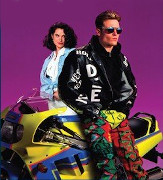|
Javid posted:Yeah, that's brilliant. The Don Shula expressway in Miami is five lanes in each direction, dead straight for almost its entire length, with wide, modern lanes and huge shoulders. Speed limit is fifty-five miles per hour. Which literally no one pays any attention to except for the occasional left lane bandit. SAFETY.
|
|
|
|

|
| # ? Apr 26, 2024 01:28 |
|
One thing I've never understood about this particular street is how the speed limit actually goes down when the street opens up. Right here, this clearly residential street gets a 35mph speed limit,  But right when it becomes 2 lanes in each direction the speed limit drops to 30 and there's a ton of signs posted and painted on the road telling you the road is 30mph.  Of course everyone goes 40+ on this stretch of road.
|
|
|
|
Mountain Dew Code Bread posted:One thing I've never understood about this particular street is how the speed limit actually goes down when the street opens up.
|
|
|
|
Koesj posted:Donít doxx my friend in the Korreweg tyvm. That street is known for having three dangerous intersections in a relatively short distance, one of which was the deadliest (or with most injuries, I forgot) intersection in the Netherlands a while ago, and that roundabout probably has some sort of similar award also. Entropist fucked around with this message at 04:20 on Nov 7, 2019 |
|
|
|
Entropist posted:Right. At the intersection there is an unbroken, continuous center line on that side of the road, and you're not allowed to overtake across those - they don't want people overtaking through intersections. The arrows indicate that that is coming up and you should get the hell out of the opposite lane. The general rule is that you can only overtake across striped lines, not continuous lines, and this is sometimes indicated per side by having one half of the double center line be striped and the other half continuous. We have similar systems in the states for indicating when its legal to pass/change lanes, but not the street markings for speed. Thats pretty cool.
|
|
|
|
Entropist posted:one of which was the deadliest (or with most injuries, I forgot) intersection in the Netherlands a while ago, and that roundabout probably has some sort of similar award also. Had you used a streetview location between those two, I could have told you the photo was taken on a monday afternoon based on which babysitting family memberís bike is parked in front of my house  But yeah, 20.000 cyclists a day or so is going to create bad safety numbers when aggregated.
|
|
|
|
Right, I was one of them during the time period in which that intersection was the deadliest, and never had any problems, though some approaches there did feel a bit sketchy. Like that split of the bike lane when going to the center into either Boterdiep or Nieuwe Ebbingestraat: https://goo.gl/maps/DWdPfcv58b9BmhqR9 Boterdiep is the Russian roulette option as it goes left, crossing the traffic that's going straight. As a cyclist you have priority, but as most people cycle straight there, you really need some faith in humanity to believe that drivers notice that you are going to turn and will stop. And that's if you signal your turn, which 90% of cyclists don't do. I'm surprised that this part of that mess isn't the most dangerous one. The other dangerous thing there, which is probably what caused the most deadly accidents, is having to cross a bus lane where the bus comes from the opposite direction than you'd expect to get into the Korreweg. And yeah, the fact that all the bike lanes are tiny and not separated from the road and randomly do or do not have priority. Quite a bit of cycling infrastructure in Groningen could use an upgrade - they were ahead of the curve at first, but because they built all the cycling stuff a while ago they are clearly behind now and there are safer alternatives for many layouts. In Utrecht and Amsterdam they manage more cycling traffic and there are some very nice intersections there that seem safer. Entropist fucked around with this message at 15:17 on Nov 7, 2019 |
|
|
|
Sure, but regarding your last point, I loving hate cycling in both Amsterdam en Utrecht since I'm so used to Groningen's idiosyncracies. The 4-way green phase for cyclists is something you internalize *very* quickly, it seems.
|
|
|
|
That is actually the one thing I do miss from Groningen. They have something like the pedestrian scramble, where everyone crosses at the same time, but with cyclists. I've seen people argue that it is inefficient, but it doesn't seem so to me. Cyclists don't need to be protected from each other with lights, and it seems like you can cross more frequently this way, and if the cars have to wait more, well, too bad. It seemed to work especially well on big four-way intersections where you might have to wait a long time otherwise. Depends on the intersection and direction you're going in though - it's also useful to be able to go along with the cars in the same direction and have a red light only if the cars are crossing your path.
|
|
|
|
Latest Do Not Eat "video" is all on the politics of Traffic Engineering. Dig in. https://www.youtube.com/watch?v=8oq0u2i4iHc
|
|
|
|
So, a very interesting "experiment" is going to happen soon. Long story short, the high court told the Netherlands government they've been badly mismanaging the EU nitrogen emission rules they promised to follow, and they'll have to fix that problem ASAP or there will be severe economical consequences. Tomorrow the government will publish their full plans to mitigate this, but one important part of it is that between the times of 6:00 and 19:00, the maximum speed on all highways will be reduced from 120 or 130 km/h to 100 km/h. This must've been a difficult decision to make since the largest party in government is pro-car, but I guess they had no choice, the alternatives are worse. Now, practically this doesn't mean much longer travel times, since the country is small enough that it doesn't really matter. Of course, psychologically it will matter because people like going fast. Anyway, I understand that traffic theory says that slower speeds mean there's less braking and accelerating overall, meaning a smoother flow of traffic, so there's a smaller chance of jams getting formed. On top of that, lower max speeds mean less traffic accidents happen, which again means less traffic jams. So the theory seems to indicate that the lower max speed could actually mean the average time to get from A to B, taking into account rush hour traffic and all that, might actually get lower. And now we'll get to see if these theories are true, I suppose.
|
|
|
|
lmao, that sounds like hell if they actually enforce the new speed limit.
|
|
|
|
ďI Canít Drive 100Ē just doesnít have the same ring to it.
|
|
|
|
MomJeans420 posted:lmao, that sounds like hell if they actually enforce the new speed limit. I'm fine with this, the country is so small that you barely even reach 130 before you are in the next city, and during rush hour our highways are just continuous slow moving traffic anyway so there's not much of a difference there. Driving trips to the north and other distant and less populated areas are going to be slightly more boring, I guess. Entropist fucked around with this message at 21:27 on Nov 12, 2019 |
|
|
|
MomJeans420 posted:lmao, that sounds like hell if they actually enforce the new speed limit. Grow up.
|
|
|
|
Loads of countries have been hit by that. In the UK weíre introducing clean air zones in several cities.
|
|
|
|
Entropist posted:I'm fine with this, the country is so small that you barely even reach 130 before you are in the next city, and during rush hour our highways are just continuous slow moving traffic anyway so there's not much of a difference there. Driving trips to the north and other distant and less populated areas are going to be slightly more boring, I guess. Down southwest/-east as well. For me it means 25% more travel time until I hit Almere, so that's 15~20 minutes. OTOH, mileage is way better when driving 100kph with the (pa)rental. For work, it would amount to a net loss, but luckily there's an NS Business Card for that. Which reminds me that travelling by train just got way more attractive over those distances during daylight hours.
|
|
|
|
Entropist posted:I'm fine with this, the country is so small that you barely even reach 130 before you are in the next city, and during rush hour our highways are just continuous slow moving traffic anyway so there's not much of a difference there. Driving trips to the north and other distant and less populated areas are going to be slightly more boring, I guess. This is so confusing. As a MERICAN, I can hit 80 before the next freeway offramp, or the second at most (1-2 miles, so... 1.6-3.2 km? silly rational units.). Do people in other parts of the world just not care about accelerating? Also, yes. Being capped at 50 mph wouldn't really matter all that much if you're never driving more than an hour away.
|
|
|
|
Chris Knight posted:Grow up. 100km/h isn't grown up, that's so old you're almost dead. Entropist posted:There are plenty of average speed checking cameras already set up along various highway trajectories, and I'm sure they're not suddenly going to stop using them when the new speed limits take effect! You should be reaching 130km/h by the time you're merging onto the freeway, let alone the next town.
|
|
|
|
Chill, dudes. If you hit the throttle on full on the up ramp and cut off several trucks getting on the highway just because you want to get to 130 km/h fast, you'll lose any time advantage that might give you at the next bit of busy traffic on the highway, or at the first traffic light when you get off the highway. All your fast accelerating/fast driving is doing is creating loud noises and make you use up a lot of fuel. It doesn't save any time at all. I'm sorry for the people who aren't able to understand rationally that accelerating faster and going faster is a net loss since there's no time profit and it just costs more fuel. They're only "I WANT MORE VROOMVROOM". But if even the party that all the people whose thought patterns don't go beyond "I WANT MORE VROOMVROOM" vote on now seem to realize this and begrudgingly changed the law, I think the point is finally starting to come across. I'm always glad when rationality wins and improves the situation for everyone, even those who assume it gets worse because there is less VROOMVROOM. Next point on the agenda: Getting the fact across to America that roundabouts allow for much more throughput than 4-way stop intersections without decreasing the safety at all.
|
|
|
|
Carbon dioxide posted:Chill, dudes. If you hit the throttle on full on the up ramp and cut off several trucks getting on the highway just because you want to get to 130 km/h fast, you'll lose any time advantage that might give you at the next bit of busy traffic on the highway, or at the first traffic light when you get off the highway. It's just safer to match full speed on the road before you merge with said road. Merging onto a road at 80km/hr when everyone else is going 120km/hr sounds like you expect everyone to slam on their brakes for you
|
|
|
|
Going faster not making you cover distance more quickly is a bold claim. If you did some peer reviewed research it could change the way we think about physics. Also modern access controlled highways are designed to allow you to accelerate comfortably on the ramp to a speed close to the prevailing speed. Itís the older ramps where you have to punch it to avoid entering with a 30 mph differential. Philadelphia has some where itís basically a yield controlled entrance to a freeway where you have to stop and wait for a gap
|
|
|
|
Devor posted:Going faster not making you cover distance more quickly is a bold claim. Yeah you could take his same argument and use it to argue that the 100 kph limit is too fast and to call for further speed limit reduction. I understand the point that car trip travel times are not just the times spent traveling on a limited access freeway and include other things like waiting at stoplights, so at some point increasing freeway speeds would face diminishing returns on reducing travel timesóbut he hasnít shown where that point is at all.
|
|
|
|
silence_kit posted:Yeah you could take his same argument and use it to argue that the 100 kph limit is too fast and to call for further speed limit reduction. the argument is that you will hit traffic and then he will catch up so you are both averaging the same speed. its a dumb argument, but my drivers ed teacher made it 25 years ago, so its far from being a new lie
|
|
|
|
RFC2324 posted:the argument is that you will hit traffic and then he will catch up so you are both averaging the same speed. I don't get this. I don't understand how driving faster would make traffic worse. When you are in heavy traffic, the speed limit doesn't really matter, so I am very confused here. This feels like a bogus 'transportation science' principle, kind of like 'latent demand' discussed in this thread earlier, where an ideological preference against car travel is disguised and a bogus empirical fact is cooked up in support of said preference. There are so many other arguments you could make in support of the idea of making car travel less convenient, not sure why people on this forum are committed to making up false ones. silence_kit fucked around with this message at 12:34 on Nov 13, 2019 |
|
|
|
silence_kit posted:I don't get this. I don't understand how driving faster would make traffic worse. When you are in heavy traffic, the speed limit doesn't really matter, so I am very confused here. I think the belief is that the traffic will be bad anyway, so they might as well drive like assholes to save a few pennies even tho they are actually part of the problem
|
|
|
|
The thing about not reaching 130 before the next city was not a serious comment... But it is actually the case that a lower maximum speed results in higher throughput with certain volumes of traffic. I'm sure there is a detailed post in this thread explaining this from the time when there were actual traffic engineers here, many years ago., but I don't remember the argument well enough to explain it myself.
|
|
|
|
There's a trial happening here in Denmark with "intelligent intersections" and having the phases of the light dictated by GPS info from the approaching cars and according to the people in charge it has reduced travel time on this stretch by 21% and reduced CO2 output as well. Meanwhile, all I can think of is that they painted a swastika in the middle. 
|
|
|
|
Ask me about being a Traffic Engineer: Ask me why my speeding habits are better than yours
|
|
|
|
silence_kit posted:I don't get this. I don't understand how driving faster would make traffic worse. When you are in heavy traffic, the speed limit doesn't really matter, so I am very confused here. Traffic backups are exacerbated by the chain reactions to starts and stops and lane changes. Accelerating faster only to get on the brakes when hitting the next clump of cars feels like you're getting somewhere faster, but the actual time gains are nominal over most travel distances and there is the potential to cause more slowdown behind you. If everyone was calmly accelerating and coasting down to meet traffic speeds, overall speeds and throughput could be higher.
|
|
|
|
Entropist posted:The thing about not reaching 130 before the next city was not a serious comment... Its on one of the very first pages, and I don't disagree. I only say you should be getting up to full speed on the ramp before you try to merge with traffic.
|
|
|
|
Since the entire purpose of the policy is to reduce emissions, you'd think people would be interested in talking about that. NOx is a major air pollutant responsible for 8 million premature deaths each year, and the European Union actually takes that seriously. On top of the existing moral and economic damage of treating all the additional patients created by those emissions, EU courts are threatening major fines against countries that refuse to reduce their pollution levels. The Netherlands is also considering halving livestock populations in order to meet emissions standards. A moderate reduction in vehicular top speeds is completely reasonable in the face of all that. If improving millions of lives and saving billions of euros means that drivers occasionally miss ten minutes of their Netflix queue, that's an acceptable compromise. If people want to resume traveling at 130 km/h during peak times, then they can implement an electronic monitoring system so that limits can be linked directly with vehicular emissions (I.e. electric vehicles could travel at top speed, whereas gas vehicles would be limited by engine efficiency). For the American audience, I'd point out that environmental speed limits are not purely a European idea either. States as varied as Texas and Oregon have limited highway speeds specifically to limit environmental damage. Dropping freeway speeds down to 65 mph, where gasoline engines typically have their best efficiency levels, is absolutely reasonable and residents quickly adjust to the new limits. Kaal fucked around with this message at 18:28 on Nov 13, 2019 |
|
|
|
do you know what's far more effective at reducing emissions than lowering speed limits? banning all cars. do that.
|
|
|
|
MrBling posted:There's a trial happening here in Denmark with "intelligent intersections" and having the phases of the light dictated by GPS info from the approaching cars and according to the people in charge it has reduced travel time on this stretch by 21% and reduced CO2 output as well. europeans love their swastikas so it's not that surprising
|
|
|
|
MrBling posted:There's a trial happening here in Denmark with "intelligent intersections" and having the phases of the light dictated by GPS info from the approaching cars and according to the people in charge it has reduced travel time on this stretch by 21% and reduced CO2 output as well. There's a similar trial going on in the Netherlands. It's called Talking Traffic. Do you have any info about the Danish project? A website or something? I'm interested in more information about this.
|
|
|
|
Carbon dioxide posted:There's a similar trial going on in the Netherlands. It's called Talking Traffic. It's probably done by the same people. The company doing the actual technical stuff is a Dutch company called Technolution and the thing is run by danish company called Gate 21. I can't find any non-Danish sources though.
|
|
|
|
Kaal posted:For the American audience, I'd point out that environmental speed limits are not purely a European idea either. States as varied as Texas and Oregon have limited highway speeds specifically to limit environmental damage. Dropping freeway speeds down to 65 mph, where gasoline engines typically have their best efficiency levels, is absolutely reasonable and residents quickly adjust to the new limits. Most trips in urban areas probably wouldn't see an appreciable difference between between 65 and 75 mph, but say, Santa Fe to Flagstaff is 4.5 hours at the usual 85 mph+ flow of traffic, 5.1 hours at the current 75 mph speed limit, and 5.9 hours at a theoretical enforced 65 mph. Dallas to El Paso - not even leaving the state - is 8.5 hours at the current 75 limit for most of that trip, that goes up to 9.8 hours at 65 mph. AreWeDrunkYet fucked around with this message at 19:13 on Nov 13, 2019 |
|
|
|
Carbon dioxide posted:Chill, dudes. If you hit the throttle on full on the up ramp and cut off several trucks getting on the highway just because you want to get to 130 km/h fast, you'll lose any time advantage that might give you at the next bit of busy traffic on the highway, or at the first traffic light when you get off the highway. Let me introduce you to the magic of splitting lanes
|
|
|
|
Entropist posted:There are plenty of average speed checking cameras already set up along various highway trajectories, and I'm sure they're not suddenly going to stop using them when the new speed limits take effect! Those are mostly on motorways that have a 80/100kph speed limit already. I can't think of any 130kph road that currently has average speed checking cameras. Even if there are some the vast majority do not have speed cameras.
|
|
|
|

|
| # ? Apr 26, 2024 01:28 |
|
AreWeDrunkYet posted:Most trips in urban areas probably wouldn't see an appreciable difference between between 65 and 75 mph, but say, Santa Fe to Flagstaff is 4.5 hours at the usual 85 mph+ flow of traffic, 5.1 hours at the current 75 mph speed limit, and 5.9 hours at a theoretical enforced 65 mph. Dallas to El Paso - not even leaving the state - is 8.5 hours at the current 75 limit for most of that trip, that goes up to 9.8 hours at 65 mph. And those edge cases are what, maybe one percent of total trips? Less than one percent? it depends a lot on how you count it. The US Federal Highway Administration estimates that trips over 100 miles represent less than 1 percent of total trips, whereas the majority are between 1-10 miles. So obviously a lower speed limit is not materially affecting those drivers, unless it's saving their lives from pollution or speed-aggravated collisions. Even if you prefer to count trips based on miles traveled, journeys over 100 miles constitute only 15 percent of all household vehicle miles. Even in your example of performing a cross-state journey of 8 hours, proceeding at 65 mph rather than 85 mph will only slow you by perhaps an hour - and if you plan to stop for gas or food or the restroom, then your percentage time savings go down even further. Meaning that on the handful of times per year you drive more than 100 miles, you're missing perhaps two episodes of Friends (one with traffic). Think back about the last time you took a cross-country road trip, versus the last time you watched some TV because you were bored and had nothing to do. This is an extremely minor inconvenience that is worth making. And the moderately longer travel times only build public support for the perennial thread favorite - high speed trains. If humans are ever going to stabilize their negative impacts on each other and the planet, they're going to have to get used to making these sorts of compromises. Kaal fucked around with this message at 20:39 on Nov 13, 2019 |
|
|



























